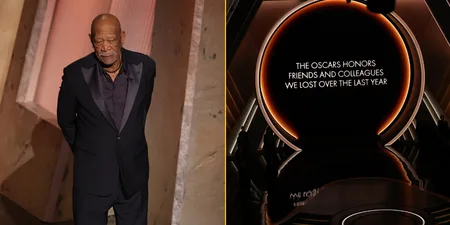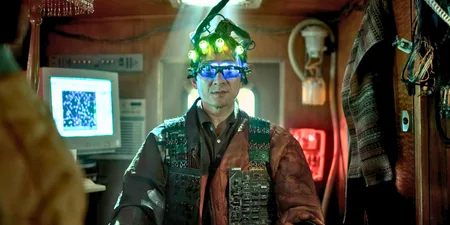There is a moment in Ronaldo, Anthony Wonke’s documentary about the Real Madrid star, where a female fan jumps a fence to attempt to meet the footballer at a training session.
Interviewed after the incident, she fights back tears when proudly revealing that “he knows I exist”.
We have since witnessed similar incidents, with Cristiano Ronaldo embracing a pitch invader during a Real Madrid game, and this welcoming attitude is more than him just playing up to the cameras.
As much as the film reveals a lot more about Ronaldo himself, it offers just as much insight into how the fame of Ronaldo and rival Lionel Messi has brought the kinds of superfan previously reserved for musicians and film stars.

The impact of executive producer Asif Kapadia – best known for earlier documentaries featuring Ayrton Senna and Amy Winehouse – can be felt throughout, but the fact that this film focuses on a living subject undoubtedly adds a new dimension to proceedings.
It means the opportunities are greater, offering
unprecedented coverage of Ronaldo’s home and family life, but at the same time the challenges are greater.
There are parallels with Amy in terms of how difficult it is for Ronaldo to go about his day-to-day life, but the footballer’s reaction sees him somewhat subdued while outside his close personal circle.
It helps explain the suggestions that he and Messi are somehow robotic or lacking in personality – the truth is that the microscope is so strong that there’s seemingly a pressure to hold things back.
Following Ronaldo over the course of 14 months, and incorporating the 2014 and 2015 Ballon d’Or ceremonies, the actual football side of proceedings is given enough scope to placate fans while also provided enough distance to make the film accessible to observers without an encyclopaedic knowledge of the events covered.
This isn’t to say Wonke takes a wholly broad-brush approach, but rather that where football features, its human side is often given precedence over the nuts and bolts of the game.
The Ballon d’Or scenes document Ronaldo’s battle for recognition, while the focus of the fly-on-the-wall World Cup coverage is the injury which could have kept him out of the tournament and the necessity to downplay the problem while the competition was ongoing; he even admits: ‘If I could go back I wouldn’t have gone to the World Cup.”
This relates back to the superfandom and the pressure placed on a footballer when he carries the hopes of a nation on his shoulders. If the World Cup playoff with Sweden was billed as Cristiano v Zlatan, this was magnified that bit further once Paulo Bento’s squad made it to South America.
https://www.youtube.com/watch?v=l-uUgyQpEZs
The one other individual from the football world who features prominently is ‘super-agent’ Jorge Mendes, and his presence helps emphasise the ‘everything is bigger’ theme of the Ronaldo/Messi duopoly at the top of football.
But with some small exceptions, Ronaldo’s compatriot features as a friend, one of the small circle of people who the player truly trusts.
Much of the coverage ahead of the film’s release has focused on Ronaldo’s son, Cristiano Junior, and the relationship between father and son is afforded even greater gravity when contrasted with the admission from the player’s mother, Dolores, that she “wanted to abort” him.
It’s the kind of honesty you don’t expect, but the closeness of the family relationship suggests there are no secrets between them.
However some things, such as the identity of Cristiano Junior’s mother, are kept unresolved – Ronaldo has sole custody of his son, whose mother has reportedly requested (and been granted) outright anonymity.
This privacy contrasts greatly with how out-in-the-open other aspects of Ronaldo’s life are, with so much of what he does in public placed under extreme scrutiny, and this encourages viewers to question which of the two extremes is the most inappropriate.
The scenes with Cristiano Junior play a big part in the film, and provide some of the lighter moments, with Ronaldo reacting to his son’s dreams of becoming a goalkeeper.
Not only does this offer a level of escapism from Ronaldo’s high-intensity Real Madrid and Portugal career, but interactions with Cristiano Junior also help remould the Messi rivalry as a friendship between two adults who care about each other’s family and home life.
Cristiano Junior is still shy when he meets Messi, though, and this returns us to the overarching theme of the film. For all the scepticism around superfandom, it can be seen as a natural reaction and at worst an infantilisation on the part of those who go to great lengths to meet their heroes.
It’s a question of what came first, the aura around superstars or the need to provide an outlet for a surplus of enthusiasm.
While we might not recall the same level of wide-eyed admiration of previous generations of footballers, it’s also true that even without the online access-from-a-distance phenomenon, the likes of Diego Maradona and even George Best were met with a level of fandom that suggests they could have faced similar issues today.
Naturally the film concludes in the only manner possible…with a montage of fans’ selfies.
https://www.youtube.com/watch?v=33gTb1v3wds
Ronaldo is released in UK cinemas on November 9.







































